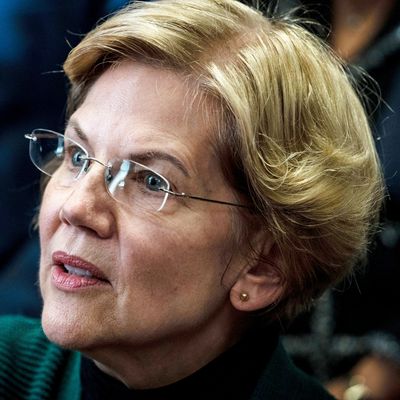
Elizabeth Warren was not my first choice when primary season began. A year ago I found myself at brunch with a handful of Beltway insiders, when the question of whom we were leaning toward came up. I named Kirsten Gillibrand and Julián Castro — the former because I admired the way she’d stood up for the eight women who’d accused Al Franken of sexual harassment even at the expense of her own career; the latter because I liked that he’d begun his candidacy with a trip to Puerto Rico, making clear his intention to center some of our most forgotten citizens.
I was aware that these two candidates were long shots, unlikely to go the distance in the race, let alone earn the nomination. But maybe that’s why I chose them: As minor players in the presidential race, it was easier to ignore their flaws, to imagine them as unburdened by the compromises and failings found in every candidate eventually.
It didn’t take a genius to predict the opposition Elizabeth Warren would face: the former Republican turned progressive crusader, the white woman who’d once claimed indigenous heritage then compounded that harm by going public with a DNA test that purported to show a fractional amount of Cherokee ancestry, even as tribe members explicitly told her that tribal membership, not genetic data, is the true measure of someone’s indigenous identity.
Despite her impressive track record as a progressive politician, there would always be someone there to remind you that she’d once given a speech to the conservative Federalist Society on bankruptcy. And the unforced error of doubling down on the harmful claim of indigenous heritage — something I couldn’t, and won’t, defend — made it far too easy to paint her as mendacious. I didn’t feel ready to tie myself to her. I was still exhausted from the all-too-recent experience of backing a similarly accomplished, and similarly flawed, wonky white woman with presidential ambitions.
But just as I’d eventually come to back Hillary Clinton in 2016 despite my many reservations about her, I found myself drawn to Warren as the primary campaign progressed. To say that I supported her because I wanted a woman president is reductive. While her gender certainly held some appeal, it was less the fact of her womanhood and more the way that her womanhood had shaped her worldview.
As a young mother, Warren had experienced firsthand the structural hurdles of having a family and a career, and felt a deep-seated sympathy for the struggles of people crushed by the excesses of our capitalist system. As a professional woman, she knew that she had to fight twice as hard as her male peers, and always be prepared to show her work. She didn’t just have a plan for everything: She thoughtfully engaged with the many ways that our society oppresses and holds back its more marginalized members and created extensive plans for remedying the wrongs done to people across the country both like and unlike herself.
But, just as with Clinton in 2016, Warren wound up pitted against Bernie Sanders. Despite the crowded field of candidates, and despite the fact that Warren and Sanders are longtime friends who spent most of the campaign engaged in a pact of mutual nonaggression (with a very notable exception), echoes of the Clinton-Sanders dynamic nevertheless defined the perception of Warren versus Sanders — even though, as Politico reported in December, Warren has long been to the left of Clinton, and even had a hand in pushing the 2016 Clinton campaign far more left than Clinton was initially inclined.
The same memes that had positioned Sanders as the cool guy and Clinton as a scolding schoolmarm began to circulate, but with Warren in Clinton’s place. The same arguments about authenticity surfaced — Sanders, we were told, had been in the fight since the early ’60s; Warren, like Clinton the Goldwater girl before her, had once been a Republican and was therefore suspect. Regardless of the fact that Warren had fought for and built the Consumer Financial Protection Bureau, a far more concrete progressive accomplishment than anything on Sanders’s decades-long résumé, she was always going to be seen as somewhat suspect — the same way that Hillary, who’d sunk considerable political capital into fighting for universal health care during the early days of her tenure as First Lady, was always positioned as a less authentic voice on health care than Sanders, whose primary contribution had been a stubborn demand for a national single-payer system.
This morning, news outlets reported that Warren would be suspending her campaign. It wasn’t particularly shocking news — after she’d washed out on Super Tuesday, it was easy to see the writing on the wall — but it was heartbreaking all the same.
There were many reasons why people chose not to support Warren. For some, Sanders’s more uncompromisingly left platform just held more appeal; for others, it was impossible to shake the fear that a woman just couldn’t win against Trump. Whatever it was that ultimately tanked her, it was exhausting to see that, yet again, an incredibly accomplished and driven woman just couldn’t get this one job done.

